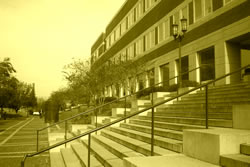|
April 4th: Lyotard's
The Postmodern Condition
"It
is our business not to supply reality but to invent allusions to the conceivable which cannot be presented." (Lyotard, p. 81)
Leading Class Discussion
Let's have Drew come up and lead the class discussion on Lyotard (probably Dylan, Vonnegut, and South Park as well).
After his presentation/discussion, we'll talk a little about the Rhetoric/al Project (due 4/25) before moving on to the rest of today's fun.
Lyotard's The Postmodern Condition
Although I wouldn't claim Lyotard is an easy read, he is certainly more accessible than others we've read. Also, all of you are pros at this stuff now, so it's easy to draw connections. If we don't get around to Lyotard's "Answering the Question: What is Postmodernism?," we'll do that next week or the week after.
I particularly like Lyotard's contributions to the rhetoric of science (and technology), but there's also the idea of, well, Postmodernism. Let's talk about the term for a bit. I have a page devoted to it from another class, so let's take a look. Remember, you aren't expected to get a handle on it in one night, one reading, one lifetime...well, it's not that difficult, but it's a concept that requires work.
Terms to Define
The following terms are important to Lyotard's discussion:
- technocracy: the condition of regulating society (and its institutions) to reflect the spirit of the late Industrial Revolution and 20th century efficiency values
- modernism: turn of the last century "condition" that observers and scholars claim influenced Western civilization; key attributes of art, architecture, and life are
- sense of alienation
- mass public; masses
- drive for efficiency
- apotheosis of technological solutions
- militarization
- high modernism: the period between WW1 and WW2; often considered a more mature modernism than that of the historical avant-garde movements of Futurism, Vorticism, Imagism, Rayonism, and others of the 1910s
- praxis: putting theory into practice
- paralogy: against an established way of reasoning
- pragmatics: linguistic field studying how context mediates/contributes to meaning
- dialectics: dialogue, discourse, discussing between two, usually opposing, speakers attempting to come to truth through reason or (what's considered established, valid) logic
- didactics: having to do with instruction; pedagogy
- positive science: value free or neutral science; how things are in absolute terms
- cybernetics: the study of structured systems and networks
- positivism: the theory that science and scientific views reign; one can directly access the natural world through one's senses (or technological protheses)
- Kant's categorical imperative: an ethical philosophy that motivates a person's action (or inaction) based on presummed duties (see also deontology)
- positive science: value free or neutral science; how things are in absolute terms
- catastrophe theory: mathematical study into the nature of how changes can or cannot effect the equilibrium of a system
There are probably more, but this is a good list to start with.
Discussion Questions/Points
Lyotard has lots to say in a pretty short space. I've come up with a few themes we ought to consider:
- Legitimation
- Pragmatics of Narrative (p. 21)
- The 3 speech acts that constitute the social bond:
1) of the speaker
2) of the listener
3) of the party referred to
- The 3 compentencies
1) know-how
2) knowing how to speak
3) knowing how to hear
- Pragmatics of Scientific Knowledge
- "Sender should speak the truth about the referent" (p. 23)
- "The addressee...[may] give (or refuse) his [or her] assent to the statement [heard]" (p. 23)
- "The referent...is supposed to be 'expressed' by [the speaker's] statement in conformity with what it actually is" (p. 24)
- What is false, non-legitimated narrative or scientific knowledge?
- Technocracy
- What makes our culture technocratic?
- What are some examples of a technocratic worldview mediating decisions or life, in general?
- What can we say about ideology and technology?
- Performativity
- Access to information
- Who has access?
- Who creates knowledge?
- Who defines "important" research of the last century "condition" that observers and scholars claim influenced Western civilization; key attributes of art, architecture, and life are
- sense of alienation
- mass public; masses
- drive for efficiency
- apotheosis of technological solutions
- militarization
- Education
- Student's role...in the presence of the master!
- My path to teaching
- Insider information on moving through the academy
- Jameson's introduction: "non-class formations such as bureacracy and technocracy" (p. xiv)
Anything else?
Next Week's Readings
We're not just going to get "real" next week; we're going to get hyperreal. Your two readings are on moodle.
.. |

